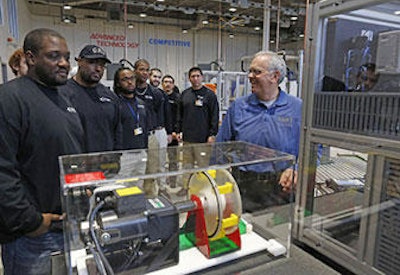
 Today we celebrate Manufacturing (MFG) Day, during which hundreds of manufacturers throughout the U.S. and Canada are hosting open houses, plant tours and career workshops, in order to raise awareness about the excellent career opportunities in manufacturing. MFG Day began in 2012 in an effort to draw attention to a major problem threatening the industry, and the overall economy — the skilled labor shortage. There are almost half a million skilled positions unfilled in manufacturing, a situation that will only worsen as baby boomers exit the industry, while fewer numbers of young people elect to enter it. We must change the perception of manufacturing as a desirable career — that’s why MFG Day matters.
Today we celebrate Manufacturing (MFG) Day, during which hundreds of manufacturers throughout the U.S. and Canada are hosting open houses, plant tours and career workshops, in order to raise awareness about the excellent career opportunities in manufacturing. MFG Day began in 2012 in an effort to draw attention to a major problem threatening the industry, and the overall economy — the skilled labor shortage. There are almost half a million skilled positions unfilled in manufacturing, a situation that will only worsen as baby boomers exit the industry, while fewer numbers of young people elect to enter it. We must change the perception of manufacturing as a desirable career — that’s why MFG Day matters.
MFG Day provides opportunities for students, parents, educators, and the media to see today’s technologically advanced manufacturing facilities. And to observe firsthand the advanced skills and knowledge base of the modern manufacturing workforce. It gives manufacturers the chance to dispel misconceptions of manufacturing as dark and dirty environments where low wages are commonplace, which is far from reality. In fact, the average annual salary for a U.S. manufacturing worker is $77,505, greater than the U.S. median of $51,371.
MFG Day is just one solution to the skills gap problem. That’s why we’d like to know, “what are you doing to address the skills gap?” We also want to share how a few Kronos customers are working toward closing the gap by creating programs that connect with and provide opportunity for the future workforce:
- Aker Philadelphia Shipyard, a leading manufacturer of vessels operating out of the U.S.
Offering a formal apprenticeship program
“We have a formalized three year apprenticeship program designed to produce highly skilled production workers who can perform successfully in a high performance work organization, compete in a world market, and participate in the future success of our organization. Approximately 90 percent of this time is spent with skilled workers in the apprentices’ craft, allowing the apprentice to master the proficiencies of his/her craft through scheduled job rotations. We recognize that classroom learning also plays a large role in developing skills; therefore, the remainder of program time is spent in a classroom environment and independent learning.” — Michel Boeckx, chief technology officer, Aker Philadelphia Shipyard
- Appvion, Inc., a leading manufacturer specializing in paper production
Working with local, trade educational institutions
“With such a large generational shift, U.S. manufacturing has the task of replacing a huge skilled workforce and we recognize this. While technology and automation has improved, we feel it is essential that we maintain the skill trades if the U.S. is to remain globally competitive in manufacturing. To address this, at Appvion, we are continuing to work with local trade schools and colleges to increase the opportunity of providing the employees of tomorrow with a solid foundation in manufacturing.” — Jason Carson, HR manager, Appvion, Inc.
- Joy Global Inc., a worldwide leader in high-productivity mining solutions
Partnering with vocational schools and compensating well
“Finding talent can prove to be very difficult. We have partnered with vocational schools -both high and post-high school technical training schools/colleges - to provide the institutions with in depth explanations of what our requirements are so they endeavor to train the students to achieve the high level of skills that we are looking for. Retaining the talent is usually not too much of a problem as we are one of the top paying manufacturers in the region.” — Chris Wright, global Kronos business process manager, Joy Global
- Magnetek, a manufacturer of digital power and motion control systems
Working with local colleges and developing interns into employees
“We partner with Waukesha Technical College and other local colleges, in particular University of Wisconsin-Milwaukee, Milwaukee School of Engineering, and Marquette University. Since they are located close to our campus, interns can continue working 10 -15 hours weekly during the school year and we encourage them to return in the summer and once they graduate, work in full time positions depending on availability.
The real key to finding and retaining young talent is to provide meaningful work and training to develop the right employees so they are confident and feel that the company has interest in his/her advancement and skills. By providing mentorship, desirable skills are transferred. Talent will only help us recruit if the company culture is a strong differentiator and because ours is, we have a very successful employee referral program.” — LindaPintor, vice president of HR, Mangetek
- Pioneer Metal Finishing, a manufacturer of metal finishing services with locations across the U.S. and Mexico
Investing in your own organizational development team
“Pioneer Metal feels the pain that most manufacturers are experiencing related to finding the talent necessary for today and the future. For us, our gap exists around finding strong leaders with the skills necessary to successfully lead, engage, and develop large teams of people. To address this, we invested very early in our own organizational development team. This gives us the capability to foster raw talent into strong leaders.
Pioneer Metal also feels that getting in front of young adults at an early age is important. We partner with a few key manufacturing alliance partners whose focus is on getting in front of students in high school and talking about careers in manufacturing. We have done several presentations with the alliance and have been a part of educational fairs to address the misperception of a career in manufacturing and show the growth and opportunities that are out there.” — Brad Nycz, director of HR, Pioneer Metal
We’d like to learn about how other organizations are addressing the skills gap. Please join the discussion and comment below.
Kylene Zenk-Batsford is the Senior Manager of the Manufacturing Practice Group at Kronos.























